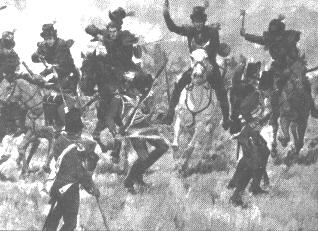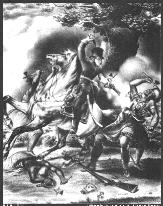


As British fortunes went on the Niagara Frontier the situation at Detroit had become very serious, Proctor had enjoyed successes at first against the Americans, but, there was the problem of getting supplies and it was wearing down his resolve. Added to his supply problems was William Henry Harrison (future President of the United States) who had just arrived with a very large force. Harrison's arrival forced General Proctor to pull his troops back to the river at Detroit.
The defeat of the British Lake Erie Squadron made the situation grave. American control of the lake made the supply problem much, much worse.
General Proctor was nothing like General Brock at all, he had no bold plan to change this situation around. Against the protests of the great Shawnee Chief Tecumseh, Proctor planned to withdraw to the western part of Upper Canada. To abandon the Detroit Frontier was to abandon the Western Indians who had fought beside the British since the beginning of the war.
On 27 September, Proctor evacuated Detroit and Amherstburg and began the long march up the Thames River toward far off Burlington. Along with the British troops was the disillusioned Tecumseh and one thousand warriors.
Tecumseh was furious, and he pleaded with General Proctor to make a stand at Matthew Dolson's farm and then again at McGregor's Creek, but Proctor would have none of it. The column pushed on mile after mile, with the British morale dropping with every step.
The wagons were moving slowly even know the enemy was in rapid pursuit. It was obvious Proctor was losing control of his small army. Proctor spent almost all of his time with his family leaving the day to day command of the army to Lieutenant Colonel Augustus Warburton. The rearguard failed to destroy the bridges after they had crossed them and only the presence of mind of the Indians kept the bridge at McGregor's Creek from falling into enemy hands.
The Shawnee warriors just managed to dismantle the bridge at McGregor's Creek when their scout reported American cavalry approaching. Tecumseh placed his men in the woods along the creek bank and waited as the American patrol cautiously moved up to the other side. The troopers started into the creek, Tecumseh waited until the lead horse was three quarters the way across and most of the troop was in the water. Then the bushes erupted in a wall of fire sending the men and horses reeling. The Americans raced up the far bank in full retreat leaving the screams and thrashing of wounded horses and dying men to mark the effectiveness of the warriors volley.
The warriors held their ground for an hour or so until the main American force came up and formed up for a charge to carry the Indian position. As they waded across the creek the Indians fired one more volley and disappeared into the woods.
Tecumseh sat by the fire with Oshawna who led the Sioux and Chippewa warriors. Oshawna deferred to the Shawnee Chief as the leader of the Indian forces because of the great respect that all the western tribe had for him. With them was William Caldwell who had been a captain in Butler's Rangers and had settled in Essex County after the American Revolution. he now commanded the Western Rangers sometimes called Caldwell's Rangers. Caldwell fought along side the Indians because he had a great deal of respect for Tecumseh.
Tecumseh considered General Proctor to be a coward, and reasoned that he would have no choice but to stand and fight the Americans at or near the Moravian Mission because the Americans would be so close to them. He discussed with his two friends the tactics that they would use in the battle that was sure to come.
The next morning the British regulars formed up for battle. It was easy to see that the long retreat had taken the fight out of the them. The ground they were holding had a swamp on the right and a river on the left, it looked like an excellant defensive position. Tecumseh immediately directed his warriors and the Rangers into the swamp to affect a flank attack to the Americans as they advanced.
The American cavalry charged, and despite the flanking fire of the Indians, carried the British line. Tecumseh was amazed as he watched the British fire two volleys and then surrender. Tecumseh rallied his warriors and fought on, his voice could be heard over the gun fire encouraging his warriors to fight on.
William Caldwell threw his musket hitting a Kentuckian who was running at him flush in the face. Like most of the Indians he had run out of ammunition and followed their example of resorting to the hatchet and knife.
Caldwell looked over and saw Tecumseh directing some of his warriors to a critical point in the battle. Tecumseh was determined to erase the disgrace of the British surrender.
Tecumseh and Caldwell's eyes met, Tecumseh moved his arm revealing a gaping chest wound. He stumbled slightly and Caldwell signaled to two of the chiefs warriors who rushed to his side. They carried Tecumseh deep into the swamp with the rest of the warriors following. The American victory at the Battle of the Thames was complete.
As the fighting began Proctor had attempted to rally his troops, but soon he fled the field leaving the surrender to Warburton. Nothing lay between the American General Harrison and the Niagara Peninsula but open country, however the season and his extended supply line forced him to turn his army back to Detroit. He then pushed on to Fort George before leaving for Sacket's Harbor.
HISTORICAL NOTES: Proctor was court martialled for his conduct in the retreat from the Detroit Frontier. He was reprimanded and suspended from rank and pay for six months. Tecumseh died of his wounds and his warriors buried him in a secret grave somewhere in the swamp in which he had fought so bravely.
